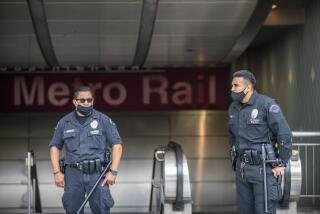N.M. Amtrak Office Is Paid for Tips on Drug Suspects
- Share via
ALBUQUERQUE — The local Amtrak office provides federal drug agents with details about suspect passengers, and Amtrak police get 10% of any cash agents seize from arrested drug couriers, a newspaper reported Wednesday.
A computer linked to Amtrak’s ticketing terminal sits on a desk at the local branch of the Drug Enforcement Administration, in what officials describe as a one-of-a-kind arrangement, the Albuquerque Journal reported.
Through it, federal agents can learn passenger names, points of origin, destinations and where, when and how the tickets were bought.
The information helps determine which passengers will be questioned--and whose luggage will be checked by a drug-sniffing dog--aboard trains stopping in Albuquerque.
Tips are passed “all over the country,” DEA Agent Kevin Small said.
In a brief e-mail to the Journal, a company spokeswoman acknowledged that Amtrak “will, upon request, participate in and provide information for law enforcement investigations.”
The computer, she added, belongs to an Amtrak investigator who is a deputized member of the DEA task force.
Debbie Hare, a spokeswoman for Amtrak, told Associated Press on Wednesday that under federal guidelines, any assets acquired by Amtrak are returned to law-enforcement efforts.
Steven Derr, assistant director of the local DEA office, said he did not know how many arrests had been made. He also said he did not know how much money had been seized but acknowledged that both figures were substantial.
“And our agreement is: Anything we seize off the train, they get 10%,” Small said.
Peter Simonson, executive director of the American Civil Liberties Union of New Mexico, called the arrangement “an insidious alliance.” He said the group is considering challenging the practice in court.
Derr defended the arrangement.
“I don’t consider that to be an invasion of privacy,” he said. “The whole idea of why we do it this way is so we’re not randomly stopping people.”
But Albuquerque defense lawyer Randi McGinn called it a manipulation of the 4th Amendment of the Constitution, which protects citizens from unreasonable search and seizure by the government.
McGinn added that it singles out the poor, who rarely use credit cards.
Derr said searches weren’t limited to passengers who paid cash for last-minute one-way tickets, because credit card purchases made just before departure sometimes raised suspicions as well.
More to Read
Sign up for Essential California
The most important California stories and recommendations in your inbox every morning.
You may occasionally receive promotional content from the Los Angeles Times.












